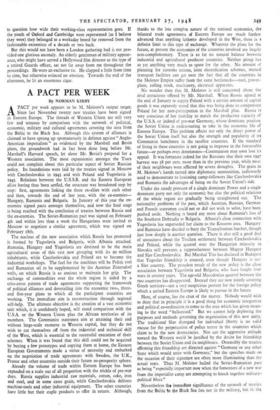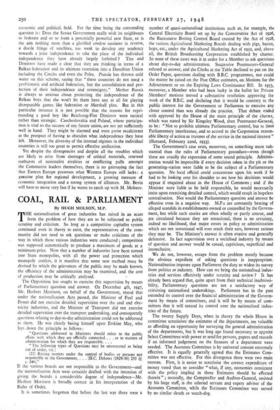A PACT PER WEEK
By NORMAN KIRBY
APACT per week appears to be M. Molotov's output target. Since last November twenty new treaties have been signed in Eastern Europe. The threads of Western Union are still very few and tenuous by comparison with the network of political, economic, military and cultural agreements covering the area from the Baltic to the Black Sea. Although this system of alliances is claimed to have sprung up spontaneously in defence against " Anglo- American imperialism " as evidenced by the Marshall and Bevin plans, the groundwork had in fact been done long before Mr. Marshall's Harvard speech, let alone Mr. Bevin's proposal for a Western association. The most expansionist amongst the Tsars could not complain about this particular aspect of Soviet Russian policy. Its foundations were laid by the treaties signed in Moscow with Czechoslovakia in 1943 and with Poland and Yugoslavia in 1945. Relations between the U.S.S.R. and the Eastern European allies having thus been settled, the structure was broadened step by step: first, agreements linking the three ex-allies with each other and then, towards the end of last year, with the ex-enemies- Hungary, Rumania and Bulgaria. In January of this year the ex- enemies signed pacts amongst themselves, and now the final stage is being reached with the conclusion of treaties between Russia and the ex-enemies. The Soviet-Rumanian pact was signed on February 4th and within less than a week the Hungarians were invited to Moscow to negotiate a similar agreement, which was signed on February 18th.
The nucleus of the new association which Russia has promoted is formed by Yugoslavia and Bulgaria, with Albania attached. Rumania, Hungary and Yugoslavia are destined to be the main agricultural areas of this vast new grouping with its 90 million inhabitants, while Czechoslovakia and Poland are to become the industrial workshops. The fuel for the machines will be Polish coal and Rumanian oil to be supplemented by the Austrian Zistersdorf wells, on which Russia is so anxious to maintain her grip. The . exchange of commodities over the whole region is aided by a criss-cross pattern of trade agreements supporting the framework of political alliances and dovetailing into the economic two-, three- and five-year plans to which all the participant countries are working. The immediate aim is reconstruction through regional self-help. The ultimate objective is the creation of a vast economic unit which, it is confidently hoped, will stand comparison with the U.S.A. or the Western Union plus the African territories of its members. The Communist statesmen aim at attaining their end without large-scale recourse to Western capital, but they do not wish to cut themselves off from the indaistrial and technical skill of the West, which is essential to the successful execution of their schemes. When it was found that this skill could not be acquired by buying a few prototypes and copying them at home, the Eastern European Governments made a virtue of necessity and embarked on the negotiation of trade agreements with Sweden, the U.K., France and other countries outside their future co-prosperity sphere.
Already the volume of trade within Eastern Europe has been expanded on a scale out of all proportion with the trickle of pre-war days. Russia supplies industrial raw materials, cotton, coke, iron and steel, and in some cases grain, while Czechoslovakia delivers machine-tools and other industrial equipment. The other countries have little but their staple products to offer in return. Although, thanks to the less complex nature of the national economies, the bilateral trade agreements of Eastern Europe are much further advanced than anything hitherto developed in the West, there is a definite limit to this type of exchange. Whatever the plans for the future, at present the economies of the countries involved are largely non-complementary. There is so far no natural balance between industrial and agricultural producer countries. Neither group has as yet anything very much to spare for the other. No amount of planning for customs unions, joint electrification schemes, mutual transport facilities can get over the fact that all the countries in the Molotov Empire suffer from the same bottlenecks—steel, power- plant, rolling stock, machinery, electrical apparatus.
No wonder then that M. Molotov is still concerned about the rival attractions offered by Mr. Marshall. When Russia agreed at the end of January to supply Poland with a certain amount of capital goods it was expressly stated that this was being done to compensate Poland for her non-participation in the Marshall plan. Russia is very conscious of her inability to match the productive capacity of the U.S.A. or indeed of pre-war Germany, whose dominant position the Soviet Union is endeavouring to take in the economic life of Eastern Europe. This problem affects not only the direct power of the Soviet Union itself but also the strength and popularity of its Communist henchmen in the satellite countries. If the standard of living in these countries is not going to improve in the foreseeable future—or perhaps even deteriorates—Communism may soon lose its appeal. It was fortunate indeed for the Russians that their own 1947 harvest was 58 per cent. more than in the previous year, while most of their neighbours were afflicted by severe droughts. The grain in M. Molotov's hands turned into diplomatic ammunition, judiciously used to demonstrate to hesitating camp-followers like Czechoslovakia and Rumania the advantages of being on the Soviet Union's side.
Under the steady pressure of a single dominant Power and a single dominant party not only the economic but also the political relations of the whole region are gradually -being straightened out. The nationality problems of the past, which Austrian, Russian, German and French statesmen could not or did not wish to solve, have been pushed aside. Nothing is heard any more about Rumania's loss of the Southern Dobrudja to Bulgaria. Albania's close connection with Yugoslavia has superseded her Claim to the Kossovo area. Hungary and Rumania have decided to bury the Transylvanian hatchet, though just how deeply is another question. There is also still a good deal of uneasiness about the Teschen settlement between Czechoslovakia and Poland, while the quarrel over the Hungarian minority in Slovakia still prevents a rapprochement between Magyar Hungary and Slav Czechoslovakia. But Marshal Tito has declared in Budapest that Yugoslav friendship is assured, even though Hungary is not a Slav country. The proudest result of the new policy is the close association between Yugoslavia and Bulgaria, who have fought four wars in seventy years. The age-old Macedonian quarrel between the two countries has disappeared. Instead they are now jointly coveting Greek territory—not a very auspicious portent for the foreign policy which a united Eastern Europe is likely to pursue in the future.
Here, of course, lies the crux of the matter. Nobody would wish to deny that in principle it is a good thing for economic integration and political co-ordination to come to the area which has given mean- ing to the word "balkanised." But we cannot help deploring the purposes and methods governing the organisation of this new unity. The traditional Slav disregard for individual liberty is no valid excuse for the perpetuation of police terror in the countries which claim to be the new democracies. Nor can the aggressive attitude toward the Western world be justified by the desire for friendship between the Soviet Union and its neighbours. Ostensibly the treaties affirming this friendship are directed against " Germany or any other State which would unite with Germany," but the speeches made on the occasion of their signature are often more illuminating than the actual texts. Thus M. Molotov hailed the Soviet-Rumanian pact as being "especially important now when the fomentors of a new war from the imperialist camp are attempting to knock together military- political blocs."
Nevertheless the immediate significance of the network of treaties from the-Baltic to the Black Sea lies not in the military, but in the
economic and political, field. For the time being the outstanding question is : Does the Soviet Government really wish its neighbours to federate and so to form a potentially powerful new State, or is the aim nothing more than a glorified cordon sanitaire in reverse, a docile fringe of satellites, too weak to develop any tendency towards a joint independence to take the place of the individual independence they have already largely forfeited ? Tito and Dimitrov have made it clear that they are thinking in terms of a Balkan federation and its ultimate extension into a Danubian Union including the Czechs and even the Poles. Pravda has thrown cold water on this scheme, saying that " these countries do not need a problematic and artificial federation, but the consolidation and pro- tection of their independence and sovereignty." Mother Russia is always so anxious about protecting the independence of the Balkan boys that she won't let them have any at all for playing disreputable games like federation or Marshall plan. But in this particular instance it is just possible that the reasons for repri- manding a good boy like Reichstag-Fire Dimitrov were tactical rather than strategic. Czechoslovakia and Poland, whose participa- tion is vital to the success of any future union, are not yet sufficiently well in hand. They might be alarmed and even prove recalcitrant at the prospect of having to abandon what independence they have left. Moreover, the diversity of the internal regimes in the individual countries is still too great to permit effective unification.
Yet despite the divergencies and despite all the troubles which are likely to arise from shortages of critical materials, renewed outbursts of nationalist rivalries or conflicting pulls amongst the Communist leaders themselves, there is no gainsaying the fact ' that Eastern Europe possesses what Western Europe still lacks: a genuine plan for regional development, a growing measure of economic integration and a strong system of alliances. Mr. Bevin will have to move very fast if he wants to catch up with M. Molotov.



































 Previous page
Previous page